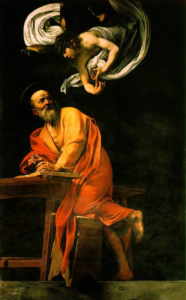Unmute
Preacher: Revd Donald MacEwan, University Chaplain
Readings: Exodus 20:1-20; Matthew 21:33-46
You’re on mute, Donald!
How often have I heard that in Teams meetings over the past six months. I still make that rookie error. Mind you for 50 years I didn’t need to press Unmute before I spoke. Nor did humankind for about 50,000 years of evolutionary history. And so I press Unmute – although some people may have preferred me to continue only speaking to myself. Indeed my wife often wishes she has a Mute button for me when I start to tell her about the golf match I’ve just played.
The number 1 seller on Amazon in Christian education is currently God on Mute, by Pete Greig. In this book he explores his own family’s experience of suffering, and the silence of unanswered prayer. Indeed one theologian has said that The most obvious characteristic of God is his silence. He does not cough or mutter or shuffle his feet to reassure us that he is there. [John Fenton]
I’d like to come back to that… another time. It’s worth a sermon, or perhaps a lifetime of sermons. But that sermon wouldn’t come from today’s readings in the Lectionary. Silence is not the most obvious characteristic of God from today’s lessons. Instead, God’s microphone is open.
And when God pressed unmute, when speaking to Moses on Mount Sinai, he uttered some of the most famous words ever recorded – the Ten Commandments. Then God spoke all these words, is how the account begins. At the end, the people wanted to close their ears, turn off the volume: v. 19: Do not let God speak to us, or we will die. They were frightened of God’s voice, and the content of his speech. And they had a point: hear again God’s rationale for the second commandment:
5 You shall not bow down to idols or worship them; for I the Lord your God am a jealous God, punishing children for the iniquity of parents, to the third and the fourth generation of those who reject me.
Punishing children for their parents’ sin!? What’s not to fear?
And the Lectionary agrees. This verse is actually missed out from the reading for today: the church authorities would rather we didn’t hear this in church. I put it back in. It was this selective muting that got me thinking this week.
After all, shouldn’t we go even further? Shouldn’t we mute God for the whole lot? For all the fear that gets instilled in us?
There are plenty of accusations about what Christians believe: that God seems pretty nasty, allowing viruses, illness and suffering; that God is against women, foreigners and LGBT people; that God feels able to consign a fair proportion of all the people who have ever lived to hell. These accusers may say that God has hidden in plain sight, telling Moses he’d punish children for the sins of their parents. They argue that the process of muting God which began with the rise of science, the age of reason and the growing Enlightenment, not least in Scotland, should simply be carried through properly.
I confess I have some sympathy with this, especially when I hear (and groan to hear) some of the pronouncements from the more fundamentalist end of the Christian faith. I’m not sure all that noise really reflects who God is. After all, in swimming pools, most of the noise comes from the shallow end.
All right. Can the New Testament help us? We can see on the cover Caravaggio’s scintillating depiction of the angel listing the stories which Matthew should include in his Gospel. God unmutes himself to Matthew.

Caravaggio, The Inspiration of Saint Matthew
And Matthew tells Jesus’s parable of the tenants in the vineyard. As we heard, the story shows the rejection of the landlord’s servants, and even his son, putting him to death. The audience of religious leaders got the point. The landlord will put those wretches to a miserable death. Indeed Jesus goes on to speak with a hint of menace:
‘Have you never read in the scriptures:
“The stone that the builders rejected
has become the cornerstone;
this was the Lord’s doing,
and it is amazing in our eyes”?
43 Therefore I tell you, the kingdom of God will be taken away from you and given to a people that produces the fruits of the kingdom. 44 The one who falls on this stone will be broken to pieces; and it will crush anyone on whom it falls.’
Intriguingly, this last verse about the stone crushing people, is not in every ancient manuscript of Matthew. (A little New Testament background – there are multiple manuscripts of the New Testament in a Greek and other languages: the English translations that we have sometimes have to choose between variant readings when the manuscripts are different.) The absence of this verse from some manuscripts could mean it was a later insertion. Or that some scribe thought it too harsh and took it out. Either way, it seems very much of a piece with the God who punishes children. Has there really been much movement over the intervening thousand years or so? Who is this God? Should we want to worship him, trust him, love him, and follow his son whose stories often end with the promise – or should that be threat – of judgment?
Perhaps a story of sound can help. Sometimes, in St Andrews, you can hear the Madras College pipe band rehearse in the evening. There are bagpipes and drums. But if you’re a long way away, all you hear is the beat of the drums. You have to come closer to hear the skirl of the pipes. Sometimes all we hear is the judgment of God, and it can seem a pretty heavy drumbeat. But if we come closer, we hear the melody, even the sweetness, of his love.
For in today’s Bible passages, when God speaks, he declares his love. True, it’s not really a valentine.
Roses are red, violets are blue,
God’s in his heaven, and really loves you….
Maybe it’s more like:
Roses are red, violets are blue,
In my holy code, mercy comes through.
We have a Covid Code in the University – eight commandments including face coverings, physical distancing, parties and how to self-isolate.
You could see the Ten Commandments as God’s holy code. They begin with God declaring what he has done for his people: he has rescued them from Egypt, and delivered them from slavery. This is a people he cares so much for that he will not leave them to suffer such injustice for ever. But nor will he leave them to the chaos and confusion of anarchy. The Ten Commandments are rules for living, guidance which leads to healthy lives, instructions for a caring community. Let’s see how this works.
One God – for a harmonious society, not going to war over rival deities.
No idols – or we’ll end up all living for our own depiction of what is best: more conflict.
Life is serious, and we need our principles clear – and so let’s not misuse the name of God, and treat the ultimate as a joke.
Have a rhythm of work and rest in our lives, or we’ll burn out trying to run and ruin the planet.
Every generation thinks they are the first to truly get the secret of life – but perhaps our parents weren’t so bad – and when we’re their age, perhaps we’ll have more sympathy – and respect.
Killing is a permanent solution to a temporary problem, and destroys God’s most basic gift – life.
Relationships require trust; sex requires trust. Faithfulness is deeply fruitful.
Community requires trust: calling something mine which isn’t mine undermines that. Calling something true which is false undermines that. And obsessing about increasing what is mine undermines that.
If we live in these ways, respecting God the giver of life and all things, and respecting each other as the vulnerable creatures we are – we will find our society to be livable, and perhaps even a place where love will flourish.
A loving parent shares rules for their children’s health and wholeness – a household code. Our loving parent offers the same.
What about Jesus’ parable of the tenants? Does mercy come through there too? Yes, it does. The heart of the story is the murder of the landlord’s son. It is of course a portrayal by Jesus of his own life given for others, offered to his fellow human beings, and rejected unto death. This is what love looks like. God didn’t stay at home, but came into the midst of his own vineyard, his own creation, and offered in-person teaching, in-person healing, in-person loving and in-person self-giving. There is a lifetime of sermons on that too.
Christians have loved the mute button. We’ve silenced things we didn’t want to hear in scripture, in the reality of human life, in the discoveries of science, in our fellow Christians and in our own hearts. Different people in different eras mute different things. And maybe it is impossible to open all microphones – maybe that would lead to a cacophony of inputs, an overstimulation, an aural chaos.
But as we make our way through this strange year of 2020, this peculiar Martinmas Semester, and our own unique lives, I hope that we can hear the authentic voice of God. Yes, it’s holy and good. And sometimes that comes across as a voice of judgment on the many ways we fail, like nothing but drumbeats. After all, our lives may feel like one rookie error after another, no matter how mature we should be. But the voice is also loving, guiding us for our own good, and forgiving us in the gracious life of Jesus. Sweet melody as well as the drums.
There could be more to say, but that’s enough for now. Amen. Donald, you’re on mute…
